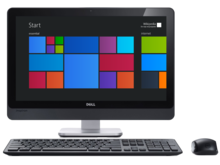
An all-in-one computer (also called an AIO or all-in-one PC) is a type of personal computer that integrates the computer components, such as the CPU, monitor, and speakers, into a single unit. It occupies a smaller footprint than a desktop computer with a tower form factor, and also uses fewer cables.
Advantages and disadvantages
Some advantages of the all-in-one computer compared to other form factors include being easier to set up, a reduced physical footprint, ease of transportation, and the option to interface with the computer via touchscreen (a now-common fixture on all-in-ones). Some disadvantages include generally being more expensive than desktop computers, a lack of customizability—most of the internal hardware such as the RAM and the SSD, especially in post-late-2010s machines, is soldered onto the system board—a lack of upgrade paths for the CPU, RAM, and technology of the display, and the difficulty of repair. The design causes it to overheat, it forces all of the components to be close together and causes minimal airflow. Having more powerful processors and graphic cards causes overheating which leads to inefficiencies.
History

This form factor was popular during the early 1980s for personal computers intended for professional use such as the Commodore PET, the Osborne 1, the TRS-80 Model II, and the Datapoint 2200. Many manufacturers of home computers like Commodore and Atari included the computer's motherboard into the same enclosure as the keyboard; these systems were most often connected to a television set for display. Apple has manufactured several popular examples of all-in-one computers, such as the compact Macintoshes of the mid-1980s and early 1990s and the iMac G3 of the late 1990s and 2000s. By the mid 2000s, many all-in-one designs have used flat-panel displays (chiefly LCDs), and later models have incorporated touchscreen displays, allowing them to be used similarly to a mobile tablet.
Since the early 2000s, some all-in-one desktops, such as the iMac G4, have used laptop components in order to reduce the size of the system case. Like most laptops, some all-in-one desktop computers are characterized by an inability to customize or upgrade internal components, as the systems' cases do not provide convenient access to upgradable components, and faults in certain aspects of the hardware may require the entire computer to be replaced, regardless of the health of its remaining components. There have been exceptions to this; the monitor portion of HP's Z1 workstation can be angled flat, and opened like a vehicle hood for access to internal hardware.
See also
References
- ^ Domingo, Joel Santo (September 13, 2012). "How to Buy an All-in-One PC". PC Magazine. Archived from the original on September 15, 2012. Retrieved November 23, 2022.
- Pogue, David (December 5, 2012). "Sleek PCs That Don't Come Cheap". The New York Times. p. B1. Archived from the original on December 6, 2012.
- Cunningham, Andrew (August 9, 2021). "The Best All-in-One Computer". The New York Times. Archived from the original on October 8, 2022.
- Hunt, Cale (November 29, 2018). "The benefits and downsides to buying an all-in-one PC". Windows Central. Future US. Archived from the original on December 28, 2018.
- Staff writer (October 17, 2022). "Desktop PC vs. All-in-One Computers: What You Should Buy?". CDW. Archived from the original on October 20, 2022.
- Smith, Matthew S. (August 19, 2015). "3 reasons you shouldn't buy an all-in-one". Digital Trends. Digital Trends Media Group. Archived from the original on August 19, 2015.
- Staff writer (February 1, 2020). "Here are 4 reasons why all-in-one PCs should be avoided". KTAR News. Bonneville International. Archived from the original on February 2, 2020.
- Staff writer (n.d.). "Definition of all-in-one". PC Magazine. Ziff-Davis. Archived from the original on December 3, 2020.
- "Thinking about an all-in-one computer? Here are the pros and cons". www.nerdsonsite.com. May 29, 2022. Retrieved May 2, 2023.
- "All-in-One PC - Knowino". www.tau.ac.il. Retrieved May 2, 2023.
- ^ Peddie, Jon (2013). The History of Visual Magic in Computers: How Beautiful Images are Made in CAD, 3D, VR and AR. Springer London. p. 352. ISBN 9781447149323 – via Google Books.
- Mueller, Scott (January 27, 2014). "Before the PC: Remembering Kaypro and Osborne Computers". InformIT. Pearson. Archived from the original on January 29, 2014.
- Welsh, Theresa M.; David Welsh (2007). Priming the Pump: How TRS-80 Enthusiasts Helped Spark the PC Revolution. Seeker Books. p. 42. ISBN 9780979346804 – via Google Books.
- Newman, Michael Z. (2017). Atari Age: The Emergence of Video Games in America. MIT Press. p. 118. ISBN 9780262035712 – via Google Books.
- Wilcox, Joe (November 12, 2002). "Review: Gateway Profile 4 vs. Apple iMac". BetaNews. Retrieved November 23, 2022.
- Schofield, Jack (September 15, 2014). "Should I buy an all-in-one PC for my small business?". The Guardian. Retrieved November 23, 2022.
- Domingo, Joel Santo (April 3, 2014). "HP Z1 G2 Review". PC Magazine. Archived from the original on April 7, 2014. Retrieved November 23, 2022.
| Computer sizes and classes | |||||||||||||||||||||||
|---|---|---|---|---|---|---|---|---|---|---|---|---|---|---|---|---|---|---|---|---|---|---|---|
| Micro |
| ||||||||||||||||||||||
| Midrange | |||||||||||||||||||||||
| Large | |||||||||||||||||||||||
| Others | |||||||||||||||||||||||